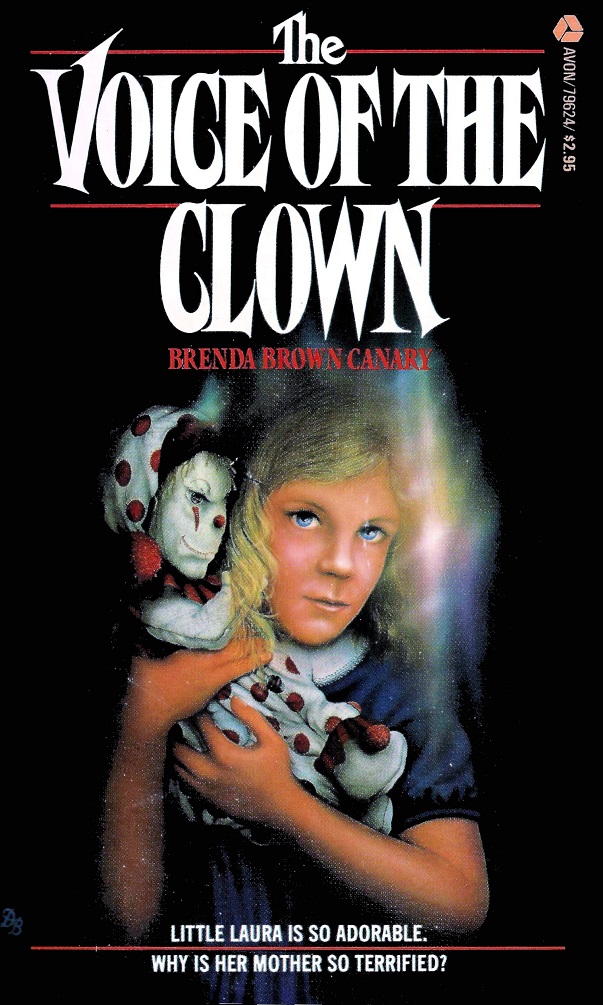
A rare title sought highly by horror lovers. Most copies are listed for $100+. Its notoriety, it seems, can be sourced to an active cult fandom and Grady Hendrix’s sweeping praise.
In Paperbacks From Hell, which chronicles the publishing history of horror literature during the 1970s and 80s, Hendrix lists this book as a standout among the “creepy kids” subgenre. He goes on to say that it’s one of the few books to ever make his “jaw drop.”
As custodian to a genre devoted to making readers gape in shlock, Hendrix’s short review has enticed many to seek out The Voice of the Clown, and willing to pay a premium price. If it shook Grady, what unimaginable horrors reside within these out-of-print pages?
Adding fuel to the flame are the publishers desperate to reprint the title without success. Valancourt Books says they’ve spent “countless hours” trying to contact Brenda Brown Canary about a reprinting, but never receive a response. Even outside members of her family have stayed mum. With Canary’s recent passing, it seems even less likely that readers will get their hands on an affordable copy. I suppose it’s also telling that the author and her family opted to let this novel disappear over time.
The book is disturbing. Mostly because six-year-old Laura is a damn creepy protagonist. Canary’s willingness to have villains and victims be of such a young age puts the reader in unchartered territory. Horror is meant to push boundaries, but even still—very young children are usually off-limits. It’s the drug-using, sex-crazed teenagers who get slashed, and the villain is typically a shadowy figure of pure evil. When the script is flipped, it feels uncomfortable and considerably more terrifying.
Laura is more complicated than simply being a creepy child, however, and Canary does a great job of showing innocence mixed with evil possession. The child’s motivations are a blend of past-life haunting, Freudian theories, and every day jealousy. While something supernatural is going on, it’s possible to imagine Laura as an ordinary kid who happened to enter the world with a black spot on her soul.
The writing is crisp and consistently paced toward impending doom. The dilemma is somewhat repetitive, to be fair, but overall extremely readable which is not always the case for ‘80s horror. Canary has a keen eye for theatrics and makes every scene dramatic. This can be tedious at times, but in a gripping, have-to-turn-the-page sort of way. It’s a heavy story that requires mental breaks. But not for long. By the midway point the plot is so full of swirling disaster that it’s impossible to avoid clawing through the last hundred and fifty pages to find out what happens. The tumultuous conclusion does not disappoint.
Although I’m not as well-read as Grady Hendrix, my overall opinion is that, while this is an excellently written book, I don’t know that it accomplishes anything truly spectacular. The blurb on the cover references The Exorcist, which is pretty close to what it tries to be. But it’s a B-grade attempt at being Blatty. The jaw-dropping moments in The Exorcist are fully realized and feel authentic. The stunners in The Voice of the Clown are more like WTF moments where you just can’t believe Canary would suddenly take it in that direction.
In any case, I do hope the Canary family will consider one of the offers to bring this novel back into accessibility. Maybe it’s not the kind of novel you bring home to Mama or want to share with your grandkids, but among her contemporaries of horror literature it is a delightfully structured tale of memorable characters, pure shlock and bizarre terror.
MORE ON THE AUTHOR
Brenda Brown Canary (September 8, 1945 – August 1, 2020) published two novels in her lifetime—Home to the Mountain (1975) and The Voice of the Clown (1982). Neither book was exactly a bestseller, but nor were they underground. Her obituary makes no note of her writing career. Possibly because her novels had become largely forgotten, or perhaps because the family didn’t consider them something to be proud of. Kudos to Grady Hendrix for legitimizing her literary endeavors. Whether or not you approve of the terrifying content in Clown, there’s no question that Canary was an outstanding writer and deserves to be remembered as such.
Keep the discussion going on our social media:

Why can someone not post a copy online to read free? The rights are owned by the author not the publisher.
Great question! Ahhh!
I have been hoping the same, Sue. The Open Library has Brenda Brown Canary’s book available to read, but unfortunately, not this one. I am dying to read it but don’t want to pay the ridiculous price that it fetches online.
I have been hoping the same, Sue. The Open Library has Brenda Brown Canary’s book available to read, but unfortunately, not this one. I am dying to read it but don’t want to pay the ridiculous price that it fetches online.